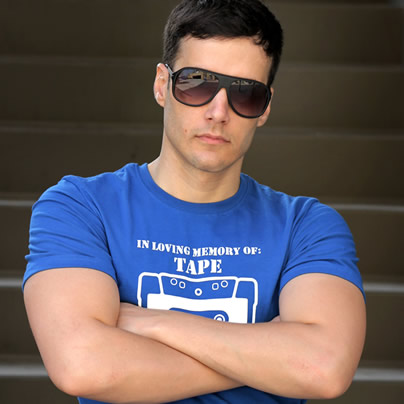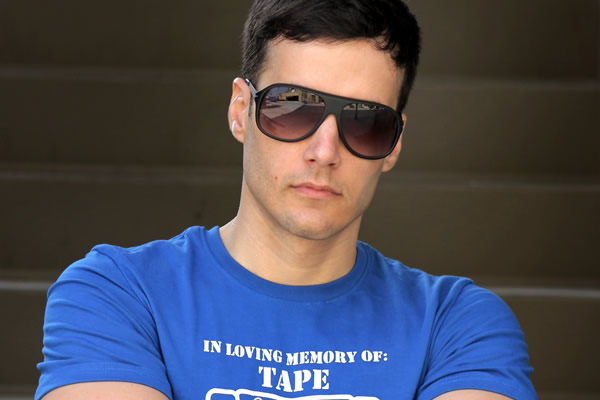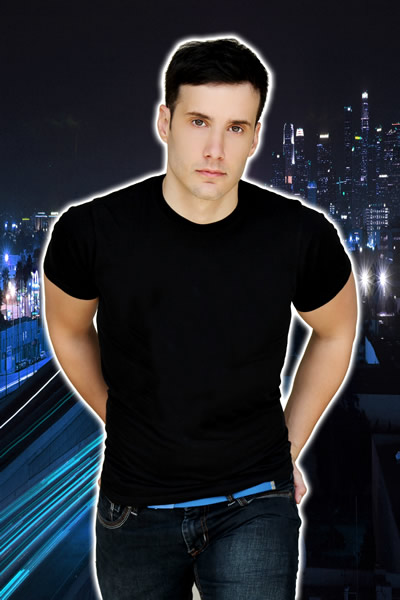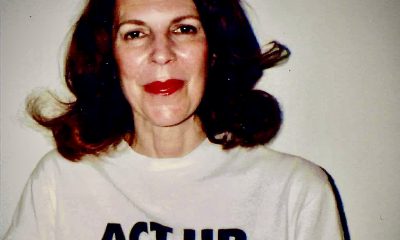Arts & Entertainment
‘He can really energize a dancefloor’
DJ Joe starts new monthly residency Friday at Cobalt


Joe Gauthreaux (Photo courtesy of Project Publicity)
The first song DJ Joe Gauthreaux remembers hearing on the radio was “Material Girl.” He was 5, it came on the car radio and made an indelible impression.
“It’s the first song I ever remember listening to as a child,” he says during a phone chat from Ft. Lauderdale. “My dad was like, ‘Ugh, that’s that Madonna,’ and … of course because they hated it so much, that made me love it all the more.”
He also feels kinship with Madonna because they share the same birthday — Aug. 16.
Gauthreaux — pronounced GO-troh — has gradually made a name for himself in the gay club scene over the last decade or so. Named “hottest DJ of the year” by Out Magazine in 2005, he’s remixed tracks for Kristine W., Jeanie Tracy and Tony Moran. Working with Joey Arbagey, an A&R rep at Universal, he’s broken into the major label world doing remixes for NeYo, The Wanted and Melanie Amaro. Three of his remixes are on the official maxi for teen idol Justin Bieber’s No. 2 (Hot 100) hit “Boyfriend.”
Now living again in New York after five years in Los Angeles, Gauthreaux is closer to D.C. He’s DJ’ed at Cobalt about four times in the last couple years and has now accepted a residency there that commences Friday from 10 p.m.-3 a.m.. It won’t always be the last Friday of the month — the next two installments are slated for Feb. 15 and March 15 — but Gauthreaux (djjoeg.com) will be there monthly. Cover is $10 and includes free vodka drinks from 11 to midnight. Keenan Orr spins downstairs (cobaltdc.com).
“After I moved back to New York, I talked to (Cobalt manager) Mark (Rutstein) about the idea of starting my own party. I really like the idea of playing somewhere regularly. On one hand, you don’t want to get too exposed, but the flip side is you can really build on it and go somewhere with the crowd over time.”
Rutstein says Gauthreaux’s move back to the East Coast makes it easier to get him down here.
“It’s a lot easier, we don’t have to fly him in from L.A. each time,” Rutstein says. “It’s really super exciting to have Joe here all the time. He has a strong following in D.C. and always packs the house.”
Rutstein also says Gauthreaux is one of the most accommodating DJs he’s worked with.
“Everyone is really different,” he says. “Joe and I just text each other and say, ‘Hey, you wanna spin?’ Drew G is the same thing. Others, like, say Junior Vasquez, take several several several e-mails and calls. Then there are others, like Peter Rauhofer, who has never once even returned my calls, so it just depends.”
Gauthreaux is established enough, he says, that crowds are willing to go where he takes them musically — within reason.
“I’ve been around awhile, so there’s a sense of trust there I think,” he says. “I’ve done my fair share of events so people know, ‘Oh, we’re gonna go hear Joe,’ they almost expect me, I think … they almost expect something a little different. Of course, I’ll play Rihanna, Madonna, but it’ll usually be a different mix they haven’t heard. You don’t want to do a whole hour of stuff they don’t know, even a really adventuresome crowd has a limit, but there’s definitely a happy medium you find. I’d feel guilty if I didn’t throw in at least a few things everybody knows. You tend to think, ‘Oh, the crowd just wants to hear the hits,’ but there’s always 10 people there who want to hear something new, so you have to find that balance.”
Erik Lars Evans, a local DJ who’s followed the gay club scene for years and considers himself a Gauthreaux fan, says Gauthreaux’s willingness to adapt has worked to his advantage.
“He’s very good at what he does and can really energize a dance floor,” Evans says. “I’ve been going to hear him spin as far back as 2002 … and he does exactly what a good DJ is supposed to do — he’s adapted. I’d say his current style is more a mix of progressive beats, house classics and circuit energy and I’d say that’s what makes him stand out in his own way and keeps fans coming to hear him.”
Evans says one of the most noticeable differences in dance music over, say, the last decade is a gradual increase of pop infiltration in gay clubs and not as much the niche artists one traditionally heard on gay dancefloors but nowhere else.
“In modern times, we’ve seen the breakdown of that barrier and you’ve seen mainstream music take over,” Evans says. “You still hear niche artists, but it’s not like it used to be.”
In some ways — and though they share the same Billboard chart — the explosion of dance music in straight culture with Deadmau5 showing up on the Grammys and on the cover of Rolling Stone with a strong rise in popularity for DJs like Skrillex, Swedish House Mafia, Avicii and Tiesto, is its own phenomenon, happening apart of gay DJs.
“I think the separation is just more apparent now because their scene has gotten so big,” Gauthreaux, who’s gay, says. “Dance for straight people was pretty much non-existent 10 years ago. I don’t want to pigeonhole them, but a lot of them were just so into hip-hop, which nowadays has gone more underground, but dance music is on the radio. I mean if you listen to Rihanna’s new album, half the songs are already club ready. Before that would never have been the case and you had to remix everything. It’s just a natural thing with the way music changes. In five years from now, it could be totally different, I’m not sure.”
Gauthreaux says the genres are distinct because gays and straights party differently.
“At the end of the day, there’s a certain comfort at walking into a club and knowing 99 percent of the people there are people you could go up and buy a drink for,” he says. “Nobody wants to be guessing, ‘Is this guy straight?,’ ‘Is this guy gay?’ It’s just a different clubbing culture altogether. Gay people go out and party. They’re not into VIP booths and champagne bottles and buttoned up shirts and girls in high heels. It’s also more violent, typically, at the straight clubs. In the gay clubs, you don’t have to worry about fights breaking out. We don’t care about champagne service. We want a DJ box and we want to get down. I think there’s a long way to go before it’s all intertwined.”
The ‘treau triv

Joe Gauthreaux (Photo courtesy of Project Publicity)
Current relationship status: Single
Any tattoos? Yes, one. My sign — Leo.
Do you follow astrology? I don’t follow every sign, but I certainly know my sign and I’m so 100 percent my sign, it’s not even funny. I also know the compatible signs for Leos.
But just for fun or seriously? Let’s say this — if I meet somebody and they’re not one of the compatible signs for me, I’m a LOT more cautious. I know that sounds ridiculous, but there’s an aspect to it that I very much believe.
How much of your set is live? “I’ve never not played live. That would just be so weird. It’s not like I’m remixing everything live right there on the spot, of course. If you want to do a mash-up or something, of course, you do that ahead of time on the computer, but that’s just one track. It’s such a creative art form, you have to feed off the crowd and you can’t do that at home by yourself.”
How long do you typically spin? “Usually four to five hours. Sometimes less if there are other DJs on the bill. But you have to take time to get a good grove going.”
Theater
‘Bad Books’ a timely look at censorship in local library
Influencer vs. conservative parent in Round House production

‘Bad Books’
Through May 4
Round House Theatre
4545 East-West Highway
Bethesda, Md.
Tickets start at $43
Roundhousetheatre.org
While a library might seem an unlikely place for a heated contretemps, it’s exactly the spot where adults go when they’re itching to battle out what books minors might be allowed to read.
In Sharyn Rothstein’s “Bad Books,” two women, The Mother (out actor Holly Twyford) and The Librarian (Kate Eastwood Norris), swiftly become mired in a quarrel that comes with some weighty repercussions.
The Mother is a popular conservative influencer on a mission. She’s furious that the local library has overstepped its bounds and she blames The Librarian, a woman who adheres to the “it takes a village” method of child rearing and is dedicated to the young people who approach her reference desk.
There’s some background. It seems The Librarian who dresses young (tight jackets and Doc Martens) and curses a blue streak, forged a friendship with Jeremy, a teenage library regular.
While the details are a bit hazy, it seems the troubled Jeremy confided in The Librarian regarding some personal issues. In return, she suggested a helpful book – Boob Juice.
Unsurprisingly, based solely on its title, the book has thrown The Mother into a pique of outrage. After finding Boob Juice in her son’s bedroom, she made a beeline to the library; and not incidentally, The Mother hasn’t read the recommended work and has no plans to do so.
Set in a suburb with lax gun laws, the story explores facets of division and conciliation. The Mother insists she isn’t so much about banning books as she is keeping some books away from young people until they’ve obtained parental approval.
“Bad Books” is performed in the round. Built on a rotating stage, Meghan Raham’s set is simple, pleasingly serviceable, and easily transforms from the library into a small corporate office, and later the assembly room of a church. Overhead floats a circular glass shelf filled with a cache of banned books. Things like a rolling book cart and a goldfish bowl add some flavor to the different locations.
The Mother wasn’t always a popular conservative warrior with an enthusiastic horde of followers.
Her past includes penning a book that later filled her with guilt and regret. She refers to that early questionable literary accomplishment as her bad book. And while over the years, she has persevered to find and destroy each and every printed copy, she hasn’t entirely succeeded.
Norris plays three women who figure meaningfully into the arc of Twyford’s mother character. In addition to The Librarian, Norris is The Manager, a broadly played piece of comic relief, and The Editor, a warm woman who reveals things about Jeremy that his own mother never knew.
Smartly staged by Ryan Rilette, the production is part of a National New Play Network Rolling World Premiere. While Rothstein’s script offers two strong roles (skillfully performed by celebrated actors Twyford and Norris), its ending feels too neatly resolved.
In the past, Twyford and Norris have successfully joined forces for numerous DMV productions including Studio Theatre’s production of David Auburn’s two-hander “Summer, 1976,” the story of a longtime and unlikely friendship between two women who meet as young mothers during the Bicentennial summer.
Though different, both The Librarian and The Mother share a strong and ultimately hopeful relationship with words.
There’s a quote from E.B. White’s classic “Charlotte’s Web” that pops up a couple of times in the briskly paced 80-minute play. Charlotte, the wise spider, says, “with just the right words you can change the world.”
Books
‘Pronoun Trouble’ reminds us that punctuation matters
‘They’ has been a shape-shifter for more than 700 years

‘Pronoun Trouble’
By John McWhorter
c.2025, Avery
$28/240 pages
Punctuation matters.
It’s tempting to skip a period at the end of a sentence Tempting to overuse exclamation points!!! very tempting to MeSs with capital letters. Dont use apostrophes. Ask a question and ignore the proper punctuation commas or question marks because seriously who cares. So guess what? Someone does, punctuation really matters, and as you’ll see in “Pronoun Trouble” by John McWhorter, so do other parts of our language.

Conversation is an odd thing. It’s spontaneous, it ebbs and flows, and it’s often inferred. Take, for instance, if you talk about him. Chances are, everyone in the conversation knows who him is. Or he. That guy there.
That’s the handy part about pronouns. Says McWhorter, pronouns “function as shorthand” for whomever we’re discussing or referring to. They’re “part of our hardwiring,” they’re found in all languages, and they’ve been around for centuries.
And, yes, pronouns are fluid.
For example, there’s the first-person pronoun, I as in me and there we go again. The singular I solely affects what comes afterward. You say “he-she IS,” and “they-you ARE” but I am. From “Black English,” I has also morphed into the perfectly acceptable Ima, shorthand for “I am going to.” Mind blown.
If you love Shakespeare, you may’ve noticed that he uses both thou and you in his plays. The former was once left to commoners and lower classes, while the latter was for people of high status or less formal situations. From you, we get y’all, yeet, ya, you-uns, and yinz. We also get “you guys,” which may have nothing to do with guys.
We and us are warmer in tone because of the inclusion implied. She is often casually used to imply cars, boats, and – warmly or not – gay men, in certain settings. It “lacks personhood,” and to use it in reference to a human is “barbarity.”
And yes, though it can sometimes be confusing to modern speakers, the singular word “they” has been a “shape-shifter” for more than 700 years.
Your high school English teacher would be proud of you, if you pick up “Pronoun Trouble.” Sadly, though, you might need her again to make sense of big parts of this book: What you’ll find here is a delightful romp through language, but it’s also very erudite.
Author John McWhorter invites readers along to conjugate verbs, and doing so will take you back to ancient literature, on a fascinating journey that’s perfect for word nerds and anyone who loves language. You’ll likely find a bit of controversy here or there on various entries, but you’ll also find humor and pop culture, an explanation for why zie never took off, and assurance that the whole flap over strictly-gendered pronouns is nothing but overblown protestation. Readers who have opinions will like that.
Still, if you just want the pronoun you want, a little between-the-lines looking is necessary here, so beware. “Pronoun Trouble” is perfect for linguists, writers, and those who love to play with words but for most readers, it’s a different kind of book, period.
The Blade may receive commissions from qualifying purchases made via this post.

Friday, April 18
“Center Aging Friday Tea Time” will be at 2 p.m. on Zoom. This is a social hour for older LGBTQ+ adults. Guests are encouraged to bring a beverage of choice. For more details, email [email protected].
Go Gay DC will host “LGBTQ+ Community Social in the City” at 7 p.m. at Hotel Zena. This event is ideal for making new friends, professional networking, idea-sharing, and community building. This event is free and more details are available on Eventbrite.
Trans and Genderqueer Game Night will be at 6 p.m. at the DC Center for the LGBT Community. This will be a relaxing, laid-back evening of games and fun. All are welcome and there’ll be card and board games on hand. Feel free to bring your own games to share. For more details, visit the DC Center’s website.
Saturday, April 19
Go Gay DC will host “LGBTQ+ Community Brunch” at 11 a.m. at Freddie’s Beach Bar & Restaurant. This fun weekly event brings the DMV area LGBTQ+ community, including Allies, together for delicious food and conversation. Attendance is free and more details are available on Eventbrite.
LGBTQ People of Color Support Group will be at 7 p.m. on Zoom. This peer support group is an outlet for LGBTQ People of Color to come together and talk about anything affecting them in a space that strives to be safe and judgement free. There are all sorts of activities like watching movies, poetry events, storytelling, and just hanging out with others. For more information and events for LGBTQ People of Color, visit thedccenter.org/poc or facebook.com/centerpoc.
“Spark Sapphic Social” will be at 8 p.m. at Spark Social House. This weekly sapphic social is an opportunity to mix and mingle with other sapphics in D.C.’s newest LGBTQ bar. This event is free and more details are available on Eventbrite.
“DC Drag Brunch on Rooftop – Penthouse (Formerly at Lima Twist)” will be at 12 p.m. at Baby Shank Rooftop. Hosted by Miss Capital Pride, this is the ultimate drag brunch experience in Washington, D.C., featuring the fiercest queens around. Prepare to be entertained by glamorous drag queens and celebrated celebrity impersonators, including Taylor Swift, Lady Gaga, Beyoncé, Britney Spears, Nicki Minaj, Ariana Grande, Whitney Houston, Cher and many more. Tickets cost $27 and are available on Eventbrite.
Sunday, April 20
Queer Crayon Club will host “Queer Sketch Social” at 3 p.m. at Sinners and Saints. This is a fun event for LGBTQ+ adults to come together and color. Attendance is free and more details are available on Eventbrite.
Monday, April 21
“Center Aging Monday Coffee & Conversation” will be at 10 a.m. on Zoom. This is a social hour for older LGBTQ+ adults. Guests are encouraged to bring a beverage of choice. For more details, email [email protected].
Tuesday, April 22
Genderqueer DC will be at 7 p.m. on Zoom. This support group is for people who identify outside of the gender binary. Whether you’re bigender, agender, genderfluid, or just know that you’re not 100% cis – this is your group. For more details, visit www.genderqueerdc.org or Facebook.
Coming Out Discussion Group will be at 7 p.m. on Zoom. This is a peer-facilitated discussion group and a safe space to share experiences about coming out and discuss topics as it relates to doing so. For more details, visit the group’s Facebook.
Wednesday, April 23
Job Club will be at 6 p.m. on Zoom. This is a weekly job support program to help job entrants and seekers, including the long-term unemployed, improve self-confidence, motivation, resilience and productivity for effective job searches and networking — allowing participants to move away from being merely “applicants” toward being “candidates.” For more information, email [email protected] or visit thedccenter.org/careers.
Asexual and Aromantic Discussion Group will be at 7 p.m. on Zoom. This is a space where people who are questioning this aspect of their identity or those who identify as asexual and/or aromantic can come together, share stories and experiences, and discuss various topics. For more details, email [email protected].
Thursday, April 24
Virtual Yoga with Sarah M. will be at 7 p.m. on Zoom. This is a free weekly class focusing on yoga, breath work, and meditation. For more details, visit the DC Center for the LGBT Community’s website.
DC Anti-Violence Project Open Meeting will be at 7 p.m. on Zoom. This meeting is open to anyone interested in learning more and getting involved in lessening violence both within and directed towards the LGBT communities. For more information, visit Facebook or Twitter.
-

 State Department5 days ago
State Department5 days agoHIV/AIDS activists protest at State Department, demand full PEPFAR funding restoration
-

 Brazil5 days ago
Brazil5 days agoUS lists transgender Brazilian congresswoman’s gender as ‘male’ on visa
-

 District of Columbia5 days ago
District of Columbia5 days agoCapital Pride wins $900,000 D.C. grant to support WorldPride
-

 Obituary4 days ago
Obituary4 days agoLocal attorney, LGBTQ rights advocate Dale Sanders dies at 75












